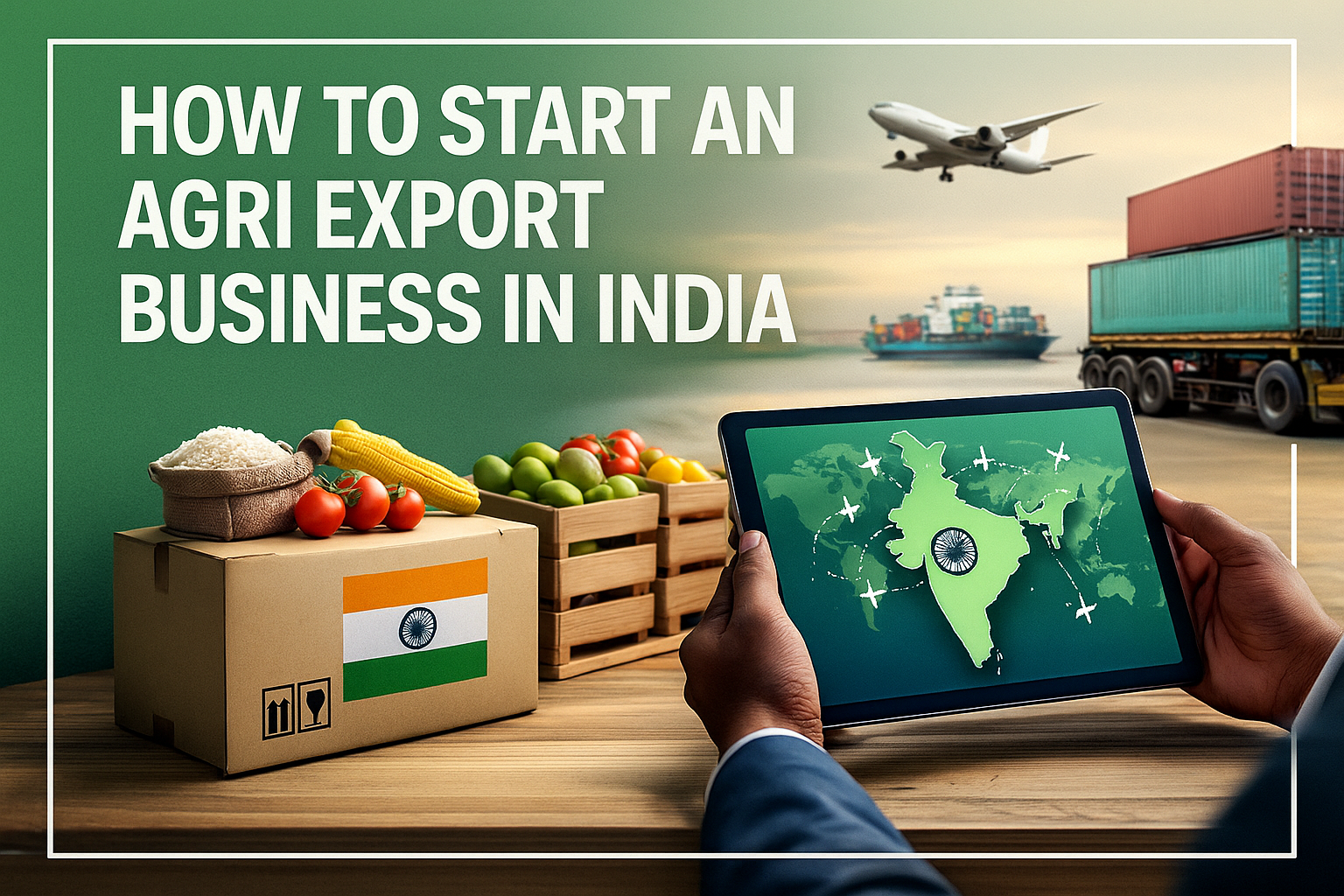
How to Start an Agri Export Business in India
Posted on November 18, 2025
India, often referred to as the “land of agriculture”, presents a lot of opportunities for entrepreneurs who are willing to go into the agriculture export business. The diversity of different kinds of crops, fruits, vegetables, spices, and processed food products has helped India to be a part of the leading exporters in the world agricultural market. If one is going to strategically approach the giant of the agri export business in India, the profits can be enormous. This guide will take you step by step through the essential steps, legal requirements, and tips to make it in this booming sector.
Why Choose Agri Export Business in India?
The agri export sector in India is booming due to several factors:
- High Demand Globally – Indian Spices, Basmati rice, Tea, Coffee, Fruits, and Vegetables are always in high demand globally.
- Government Support – The Government of India is giving incentives, subsidies, and schemes for export agriculture.
- Profit Potential –Exporting agricultural products can turn in more profits vis-a-vis local sales under high international pricing.
- Abundant Resources –India produces a wide variety of exportable crops because of the country’s various climates.
Steps to Start an Agri Export Business in India
1. Conduct Market Research
In the beginning, the research world demands highlighting high-demand items, target markets, and competitors before opening an agricultural export business. Among the countries, India is a prominent exporter of basmati rice, spices, fresh fruits, and many more items like mangoes, pomegranates, and grapes. Through watching trade reports, online databases, and market trends, one could start learning about profitable exports and new opportunities.
2. Prepare a Business Plan
An agri export business plan that is properly organised spells out the objectives, target markets, export products, supply chain, logistics, marketing, sales, and financial projections. It works like a map and also assists in getting bank loans or drawing in investors for the expansion of the business.
3. Register Your Export Business
In order to run an agri-export business in India, first, have the appropriate company registration, which can be either Proprietorship, Partnership, LLP, or Pvt Ltd, completed, and then get an Import Export Code (IEC) issued. GST and FSSAI licenses are necessary, while certifications like Agmark, ISO, or Organic will enhance the reputation in the international markets.
4. Source Quality Products
An agri export business’s success is largely determined by the product’s quality. It is very important to deal with trustworthy farmers, cooperatives, or suppliers to get the freshest and best agricultural products. Proper storage and product handling before shipment are very important to keep the products’ quality, freshness, and shelf life. Through the continuous supply of the best goods, one not only is recognised but also gains the confidence of the foreign buyers and thus can be cemented in the already tough agri export market.
5. Packaging and Labelling
Internationally, always employ packaging that lasts long, is safe for human use, and is good for the environment. Mark the packages correctly with the information about the product, the place of production, and the quality, as well as being certified. Quality packing keeps products, makes the brand more visible, and increases the trust of customers in foreign markets.
6. Logistics and Shipping
Logistics and shipping done well are very important to delivering your agricultural products on time. Cooperate with trustworthy freight forwarders and shipping firms who have a good knowledge of international trade laws. For such products, cold chain logistics is a must from the time of harvest to the consumer, and even in between that. Gather and keep ready all the required export documents, such as invoices, packing lists, and certificates of origin, and also think about getting shipping insurance, which will cover your goods against any damages or loss during transit. Flawless logistics operations create happy customers and become a foundation for long-term partnerships.
7. Marketing Your Products
By having a website and marketing online, you will be able to do business all over the world. Trade fairs will be a good opportunity to meet the international buyers. Show the uniqueness of Indian agricultural products through good quality, the use of organic methods, and the registration as GI products to be different from the competitors.
Government Schemes and Support
The Indian government offers several schemes for agri exporters, such as:
- Agriculture Export Policy – To promote diversification and increase the export of high-value products
- MEIS (Merchandise Exports from India Scheme) – Provides incentives for exporting agricultural goods
- APEDA Support – The Agricultural and Processed Food Products Export Development Authority (APEDA) extends the following support to exporters: documentation assistance, training, and market promotion.
Leveraging these structures actively drops and facilitates the running of the business.
Conclusion:
India is a promising venture of agribusiness export if it is done with proper planning, market research, and compliance. Quality needs to be the main concern in the whole process; understanding of the international regulations and cooperation with the buyers should also be strong points in the direction of creating a sustainable and profitable export business. Government support and growing global demand for Indian agricultural products make this the right time to enter the market of agricultural export.
